人教版七年级英语下册unit3知识点
初中英语人教版七年级下册Unit 3 How do you get to school知识点
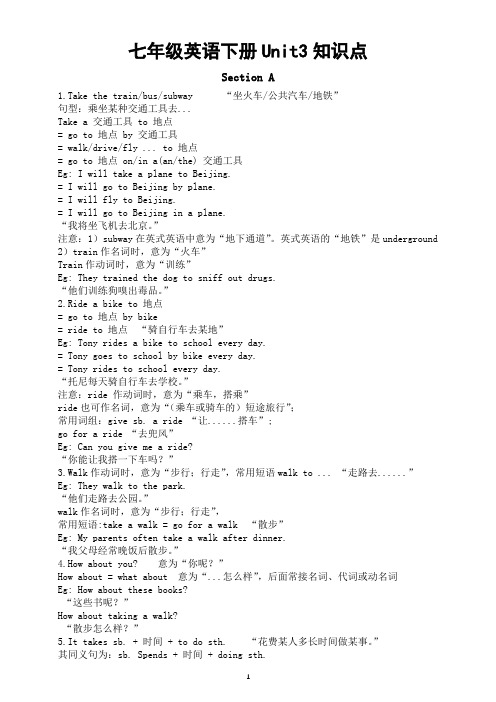
七年级英语下册Unit3知识点Section A1.Take the train/bus/subway “坐火车/公共汽车/地铁”句型:乘坐某种交通工具去...Take a 交通工具 to 地点= go to 地点 by 交通工具= walk/drive/fly ... to 地点= go to 地点 on/in a(an/the) 交通工具Eg: I will take a plane to Beijing.= I will go to Beijing by plane.= I will fly to Beijing.= I will go to Beijing in a plane.“我将坐飞机去北京。
”注意:1)subway在英式英语中意为“地下通道”。
英式英语的“地铁”是underground 2)train作名词时,意为“火车”Train作动词时,意为“训练”Eg: They trained the dog to sniff out drugs.“他们训练狗嗅出毒品。
”2.Ride a bike to 地点= go to 地点 by bike= ride to 地点“骑自行车去某地”Eg: Tony rides a bike to school every day.= Tony goes to school by bike every day.= Tony rides to school every day.“托尼每天骑自行车去学校。
”注意:ride 作动词时,意为“乘车,搭乘”ride也可作名词,意为“(乘车或骑车的)短途旅行”;常用词组:give sb. a ride “让......搭车”;go for a ride “去兜风”Eg: Can you give me a ride?“你能让我搭一下车吗?”3.Walk作动词时,意为“步行;行走”,常用短语walk to ... “走路去......”Eg: They walk to the park.“他们走路去公园。
人教版七年级下册英语Unit 3 知识点语法归纳总结

人教版七年级下册英语Unit 3 知识点语法归纳总结Unit 3 How do you get to school?In this unit。
we will learn how to talk about n and how to describe our daily commute to school.1.Phrases to remember:Get to school: Arrive at schoolTake the subway: Use the subway as nRide a bike: Use a bicycle as nHow far: The distance een two placesFrom home to school: The distance een home and schoolEvery day: DailyTake the bus: Use the bus as nLeave Beijing for Shanghai: Depart from Beijing to Shanghaieful sentences:How do you get to school。
I ride my bike to school.How far is it from your home to school?How long does it take you to get to school?For many students。
it is easy to get to school.age:1) How to express n:How do you get to school?When describing n。
we usually use ns such as "by" (without "a/the").BusThink ofeen。
Unit3词汇精讲及短语人教版七年级英语下册

1.get to 到达例句:你怎么到学校?(G7下,U3,P13) How do you get to school?【注意】:当地点是副词home/here/there等时,to要省略。
例句:到家要多久?(G7下,U3,P15) How long does it take to get home?【扩展】:get to= arrive in/at或reach arrive at+小地点arrive in +大地点reach +地点(及物动词直接接地点)2.train/trem/cn.火车------复数trains短语:go to...by train=go to... on a/the train= take a/ the train to ...乘火车去……例句:你怎么去学校?How do you go to school?I take the train the school.=I go to school by train/ on the train3.bus Cn.公共汽车--------复数buses短语:go to...by bus=go to... on a/the bus= take a/ the bus to ...乘公交车去……例句:他坐公交车上班。
He takes the bus to work=He goes to work by bus/on the bus.例句:你的朋友们坐公交车上学吗?Do your friends go to school by bus?4. subway Cn. 地铁------复数subways例句:我骑自行车去地铁站。
短语:go to...by subway=go to... on the subwaytake the subway to...乘地铁去......例句:我们乘地铁去公园we take the subway to the park.=we go to the park by subway/on the subway.5.ride vt.骑cn.旅程------过去式rode 单三形式rides-----现在分词riding 骑手(cn.) rider短语:ride a /the /one’s bike(s) to== go to …by bike=go to… on a /the bike 骑直行车去……骑马ride a horse ==go ridingI ride my bike to school every morning .6.bike/bak/cn.自行车-----复数bikes短语:ride a bike 例句:你是走路还是骑自行车呢?Do you walk or ride a bike?7.sixty num.六十-----复数sixties ----序数词sixtieth8. Seventy num. 七十-----复数seventies -----序数词seventieth 9. eighty num.八十-----复数eighties -----序数词eightieth 10. ninety num. 九十----复数nineties----- 序数词ninetieth 11. hundred /'h ndr d/num. 一百【注意】:hundred 前有数字时,hundred 不用复数,直接接可数名词复数,也不与of 连例句:2000名学生在这个学校There are 2000 students in the school.【注意】表示一个不确定数时,前面没有具体数字,其后加s ,与of 连用。
人教版七年级英语下册Unit 3 重点知识点总结

人教版七年级英语下册Unit 3 重点知识点总结人教版七年级英语下册Unit 3 重点知识点总结Unit 3 Why do you like koalas?一、词组want to do sth .想要做某事want sb to do sth 想要某做某事want sth 想要某物Let sb do sth 让某人做某事d of 有几分种类a kind of 一种……years old …年龄如:ten years old 十岁like to do sth 喜欢做某事like doinglay with … 与...一起玩be quiet 安静during the day 在白天at night 在夜间have a look at.. 看…一个...另一个二、句型(1)、-why do you like pandas?-Because they’re very cu(2)、-Why dose he like koalas?-Becauare kindg.(3)、-Where are l?-Lions auth Africa.(4)、-What animals do you like?-I like elepha三、日常交际用语(1)、-Let’l(2)-Why do you walions?-Becaare very cu(3)-Do you like giraffes?I do./ No,I don’t(4)-Whaanimal do you like?_I like dog+ 名词的复数.表示没有特定的数量范围+名词的复数表示有特定的数量范围.(5)-Why are you looking at me?-Because you are very cu(6)-Let us play games. –Great!L。
人教版英语七年级下册单元Unit 3 知识点+测试卷+思维导图
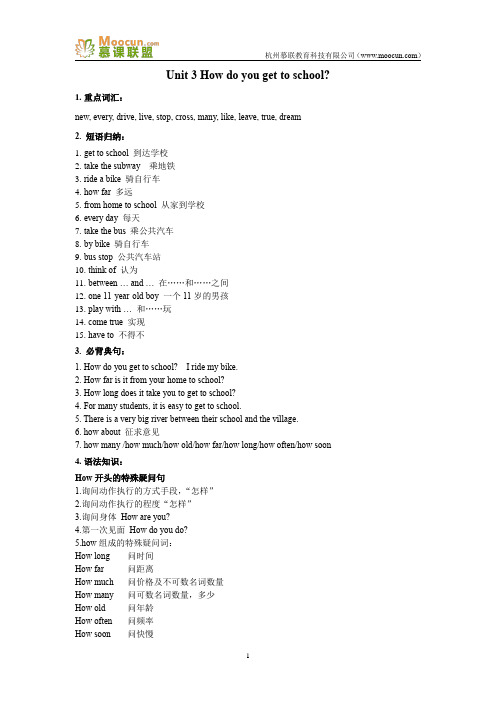
Unit 3 How do you get to school?1.重点词汇:new, every, drive, live, stop, cross, many, like, leave, true, dream2. 短语归纳:1.get to school 到达学校2.take the subway 乘地铁3.ride a bike 骑自行车4.how far 多远5.from home to school 从家到学校6.every day 每天7.take the bus 乘公共汽车8.by bike 骑自行车9.bus stop 公共汽车站10.think of 认为11.between … and … 在……和……之间12.one 11-year-old boy 一个11岁的男孩13.play with … 和……玩e true 实现15.have to 不得不3. 必背典句:1. How do you get to school? I ride my bike.2. How far is it from your home to school?3. How long does it take you to get to school?4. For many students, it is easy to get to school.5. There is a very big river between their school and the village.6. how about 征求意见7. how many /how much/how old/how far/how long/how often/how soon 4.语法知识:How开头的特殊疑问句1.询问动作执行的方式手段,“怎样”2.询问动作执行的程度“怎样”3.询问身体How are you?4.第一次见面How do you do?5.how组成的特殊疑问词:How long问时间How far问距离How much问价格及不可数名词数量How many问可数名词数量,多少How old问年龄How often 问频率How soon问快慢人教版英语七下Unit 3 How do you get to school?单元测试卷(时间:90分钟分值:100分)一.单项填空(每小题1分,共10分)1.— do you like your new bike?—It’s cool.A.HowB.WhatC.WhereD.Why2.—Our class wins the English speaking contest.—Congratulations! You be very proud of it.A.canB.needC.wouldD.must3.He usually goes to school bike,but sometimes he goes to school foot.A.with;onB.on;byC.on;withD.by;on4.It them about half an hour to get to school every day.A.spendsB.costsC.paysD.takes5.—How do you go to the park?—I my bike there.A.driveB.rideC.getD.stand6.—I have to get to the airport at 10:00 but it’s 9:40 now.— ! I can send you there by car.A.Thank youB.Hurry upC.Don’t worryD.Try your best7.When it rains, I a taxi to the post office.A.makeB.takeC.bringD.want8.— is it from your home to the bank?—Three miles.A.How farB.How muchC.How soonD.How long9.—How far is your teacher’s home from here?—It’s about two drive.A.hour’sB.hoursC.hours’D.hour10.How does she Shanghai?A.reachesB.arrive atC.get toD.gets二.完形填空(每小题2分,满分20分)Tom 1 near the sea. Their house is not very high, but it is beautiful. There 2 big trees and a small garden in front 3 their house.They plant flowers in the garden. Some are red, some are white 4 some are blue. Tom and his family love 5 garden very much.6 Tom and his sister go to school7 bus. The bus is comfortable. There are air conditioners in the bus. And it is a double decker bus. After school,they sometimes help their mum8 some shopping at the Shopping Centre, and sometimes help their dad in the garden. At weekends, they often take some photos by the sea.9 summer, they often go swimming 10 their parents.1.A.lives B.lived C.living D.liveing2.A.are B.is C.was D.be3.A.to B.for C.at D.of4.A.but B.or C.at D.and5.A.they B.them C.their D.theirs6.A.All B.Both C.Some D.Two7.A.on B.by C.take D.sit8.A.do B.doing C.does D.did9.A.In B.On C.At D.To10.A.and B.for C.of D.with三.阅读理解(每小题2分,满分30分)AHello, everyone! I’m Kathy. I live in Washington, D.C. I’m in Grade 8. I spend about half an hour on my homework every day. My homework this week is to find out how much homework students have now. Please tell me about your homework on the website.1. Why does Kathy want others to tell her about their homework?A. Because she wants to know about her classmates.B. Because she wants to make friends on the Internet.C. Because she wants to finish her homework.D. Because she wants to find someone to do her homework.2. What will Linda do if she has problems with her homework?A. Ask her brother for help.B. Ask her teacher for help.C. Use the Internet for help.D. Discuss them with her friends.3. ____ spends the most time on homework.A. KathyB. BenC. LindaD. Jack4. Which two students are in the same grade?A. Kathy and Linda.B. Linda and Jack.C. Ben and Jack.D. Kathy and Jack.5. How many of the four students use the Internet for homework?A. OneB. TwoC. ThreeD. FourBSome children are flying kites near the river. They are very high and Peter can see them fromthe classroom. After lunch his aunt comes to see his mother and brings a kite to him. It looks like a bird. He wants to fly it but his mother doesn’t let him do that.“It’s time to go to school,” says his mother, “You can fly it after dinner.”The boy is unhappy, and says goodbye to his aunt and leaves. Now he is in the classroom but he doesn’t listen to Miss Black. He only thinks how to fly the kite. Miss Black writes something on the blackboard and then turns to the class.“Name(说出……的名字) nine things with milk in them, Peter.” she says.The boy doesn’t hear her and still sits there. A boy in Row 4 beats(敲打)his back and he knows it. He stands up and Miss Black asks him the question again. He thinks for some time and then says, “Yes, madam, tea, coffee, cake and…er… six cows(奶牛).”1. There is ____ near Peter’s school.A. a bankB. a riverC. a lakeD. a park2. In the classroom, Peter can see ____.A. some children swimming in the parkB. his aunt buy a kite for himC. some students reading beside the lakeD. some children flying kites near the river3. ____ comes to visit his mother after lunch.A. Peter’s teacherB. Peter’s friendC. Peter’s cousinD. Peter’s aunt4. Peter’s mother tells him to fly the kite ____.A. at breakfastB. in the classroomC. after dinnerD. in school5. In class, Peter only thinks ____.A. his teacher’s wordsB. what the kite looks likeC. how to fly the kiteD. how to answer the teacher’s questionCIf you go to Hong Kong by air, you will arrive at Hong Kong International Airport.Because there was not enough land, this was built (被建造)out into the sea.It is in the part of Hong Kong called Kowloon.Kowloon is one of the two big cities in Hong Kong.The other city is Hong Kong itself.It is on an island.You can get there by ship or through a tunnel(隧道)under the sea.Much of Hong Kon g is farmland and mountains.The population of Hong Kong is over six million.Chinese and English are spoken by many people.Clothes,computers,radios and TVs are made in Hong Kong.You can buy all kinds of things,such as watches and computers there.People from all over the world travel to Hong Kong every year.You can watch dog racing or motor racing.Some places are quiet and beautiful.When you are hot and tired,there are small cool gardens to rest in.There are also a lot of hotels to live in.Hong Kong is also a good place for wonderful Chinese food.You can enjoy many kinds of food,for example,fish,vegetables and the famous Beijing Duck.There is certainly a lot to see and to do in Hong Kong.1.The airport was built out into the sea because .A.it is near the seaB.there was not enough landC.planes arrive safelyD.it would be good2.Kowloon is .A.the name of a countryB.the name of an airportC.one of the two big cities in Hong KongD.a big city under the sea3.Most people in Hong Kong speak .A.neither Chinese nor EnglishB.Chinese onlyC.English onlyD.Chinese and English4.There are travelers in Hong Kong every year.A.a lot ofB.fewC.severalD.some5.The main idea(大意)of the fourth paragraph is “ ”.A.Dog racing is interestingB.Beijing Duck is famousC.Chinese food is famousD.Hong Kong is a good place for traveling四.任务型阅读(每题2分,共10分)The new school term is coming. Now the school clerks are planning a new timetable for Class 5,Grade 7.There are six classes every day,four in the morning and two in the afternoon. The students have a math class every day. And they have seven English classes in a week. Two of them are given by a foreign teacher and should be arranged(安排)together on Thursday morning.There are five Chinese classes in a week. Two of them should also be arranged one after the other for the students to write their compositions.They have two physics classes in a week but on different days. Besides these,there is an art class every Wednesday afternoon.It’s necessary and important for students to take enough exercise. So they have two PE classes every week. And they can do outdoor activities after school every afternoon.阅读短文内容后,将下面的课程表补充完整。
人教版七年级英语下册Unit3_单元要点梳理总结

Unit3 单元要点梳理总结重点短语1.学校旅行school trip2.去散步go for a walk3.挤牛奶milk a cow4.骑马ride a horse5.喂鸡feed chickens6.与农民交谈talk with a farmer7.照相take photos 8.问一些问题ask some questions9.种苹果grow apples 10.带某人逛/参观某地show sb. around11.学到许多learn a lot 12.摘草莓pick some strawberries13.上周last week 14.在乡村in the countrysidevisit my grandparents 16.去钓鱼go fishing15.拜访我的祖父母17.去爬山climb the mountains 18.参观博物馆visit a museum19. 画画draw pictures 20.去学校旅行go on a school trip21.礼品店gift shop 22.为某人买某物buy sth for sb.23.总得来说all in all 24.对……感兴趣be interested in...25.一点儿也不not...at all重点句型1.你见到奶牛了吗?Did you see any cows?2.我见到了而且见到了很多很多。
Yes, I did. I saw quite a lot.3.卡罗尔拍照片了吗?Did Carol take any photos?4.是的,她拍了。
Yes, she did.5.你好,Eric,上周旅游怎么样?Hi, Eric, How was your trip last week?6.精彩极了,我还去乡下看望了爷爷奶奶。
It was excellent. I visited my grandparents in thecountryside.7.我们玩得非常开心!We had so much fun!8.我也拍了好多精彩照片。
[全]人教版七年级英语下册unit3单词、知识梳理、词汇句型精讲
![[全]人教版七年级英语下册unit3单词、知识梳理、词汇句型精讲](https://img.taocdn.com/s3/m/423f4bb2f5335a8102d220e1.png)
人教版七年级英语下册unit3单词、知识梳理、词汇句型精讲Unit3 How do you get to school?1Unit 3单词(音标)train [tren] n.火车bus [bs] n.公共汽车;公交车subway ['sbwe] n.地铁take the subway 乘地铁ride [rad] v.骑n.旅程bike [ba k] n. 自行车ride a bike 骑自行车sixty ['skst] num.六十seventy ['sevnt] num.七十eighty ['et] num.八十ninety['nant] num.九十hundred ['hndrd] num.一百minute['mnt] n.分钟far [fɑ] adv. & adj. 远;远的kilometer ['kl,mit(r)] n.公里new [nju] adj. 新的;刚出现的every ['evr] adj. 每一;每个every day 每天by [ba] prep. (表示方式)乘(交通工具)by bike 骑自行车drive [drav] v. 开车car [kɑ] n.小汽车;轿车live[lv] v. 居住;生活stop [stɑ:p][stp] n. 车站;v. 停止think of 认为cross [krs] v.横过;越过river ['rv] n.河;江many ['men] adj. & pron.许多village ['vld] n.村庄;村镇between [b'twin] prep.介于…之间between…and…在……和……之间bridge [brd] n.桥boat [bt] n.小船ropeway ['rpwe] n.索道year [j] [ j] n.年;岁afraid ['fred] adj.害怕;惧怕like [lak] prep.像;leave [liv] v.离开dream [drim] n.梦想;睡梦v.做梦true [tru] adj.真的;符合事实的come true实现;成为现实Dave[deiv] 戴夫(男名2 Unit3 知识梳理◆短语归纳1. get to school 到达学校2. take the subway 乘地铁3. ride a bike 骑自行车4. how far 多远5. from home to school 从家到学校6. every day 每天7. take the bus 乘公共汽车8. by bike 骑自行车9. bus stop 公共汽车站10. think of 认为11. between…and…在…和…之间12. one 11-year-old boy 一个11岁的男孩13.play with…和…玩14. come true 实现15. have to 不得不◆用法集萃1. take…to…= go to…by…乘…去…2. How do/does sb get to…? 某人是怎样到…的?3. How far is it from…to…? 从…到…有多远?4. It takes sb. some time to do sth. 做某事花费某人多长时间。
人教版七年级下册英语第三单元知识点梳理

人教版七年级下册英语第三单元知识点梳理Unit 3 How do you go to school一、词汇与短语◆重点单词◆重点句子◆重点单词变形二、语法知识点A部分知识点1.与how构成的词组引导的特殊疑问句❶ how表示爱好、程度、看法等,意为“……怎么样?”。
eg:—How do you like the music?你觉得这首乐曲如何?—I like it very much.我非常喜欢它。
How is your Chinese?你的汉语如何?How do you like China?你认为中国怎么样?❷用于询问身体健康状况,意为“……怎么样?”。
eg:How do you do?你好!How are you?你(身体)好吗?❸ how提问交通方式。
其答语分三种情况:◆take a/the+表示交通工具的名词◆by +表示交通工具的单数名词◆on/in+限定词+表示交通工具的名词eg:How do you go to workevery day? 你每天怎样去上班?I take the subway to work. 我乘地铁去上班。
=I go to work by subway.=I go to work in the subway.❹表示感叹。
eg:How cold it is today!今天好冷啊!How hard they are working!他们在多么辛勤地劳动啊!How fast he runs!他跑得多快啊!❺表示某种方式、手段或方法。
eg:How do you spell it?你怎样拼写它?How did he go to schoolyesterday?他昨天是怎样去上学的?How do you know about it?你怎么知道这件事的?❻ how about用于询问或征询意见等,相当于what about,后接名词、代词或动词的-ing形式,意为“……怎么样?”。
人教版七年级下册英语Unit 3 How do you get to school语法总结

It takes him 20 minutes to do his homework. (对话线部分
提问)
→How long d oes it take him to do his homework?
2)How long也可以询问某事物的具体长度。
如:
---How long is the desk?这张桌子有多长?
---It’s 1.2 meters. 它1.2米。
四、How far 引导的特殊疑问句
How far“多远”,询问路程、距离。
如:
How far is it from here to school? 从这儿到学校有多远?
答语有两种表达方式:
1)用长度单位。
如:It is five kilo meters. 五公里
2)用时间表示如:It is twenty minutes’walk. 二十分钟的步行路程。
五、句型:It takes sb. some time to do sth. (做某事花费某人多长时间)
注:It在此句型结构中为形式主语,真正的主语是不定式短语。
take 意为“花费”并且只能表示花费----时间
eg: It takes me half an hour to do my homework.(写作业花费了我半个小时)。
人教版七年级英语下册unit3(详细内容)
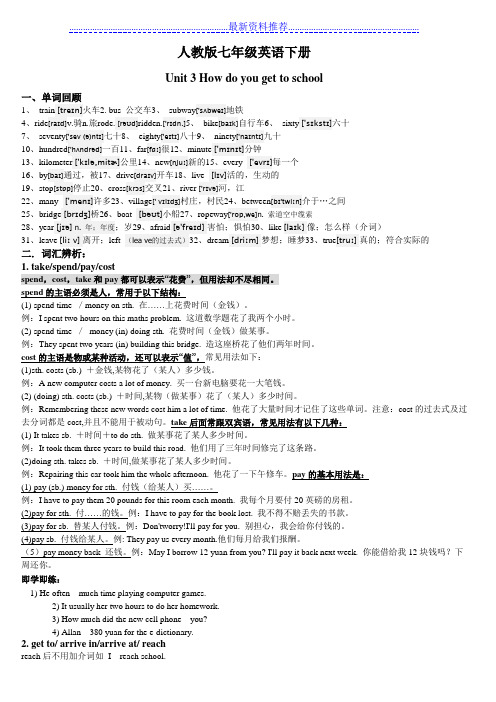
人教版七年级英语下册Unit 3 How do you get to school一、单词回顾1、train[treɪn]火车2. bus 公交车3、subway['sʌbweɪ]地铁4、ride[raɪd]v.骑n.旅rode. [rəʊd]ridden.['rɪdn.]5、bike[baɪk]自行车6、sixty['sɪkstɪ]六十7、seventy['sev (ə)ntɪ]七十8、eighty['eɪtɪ]八十9、ninety['naɪntɪ]九十10、hundred['hʌndrəd]一百11、far[fɑː]很12、minute['mɪnɪt]分钟13、kilometer['kɪlə,mitɚ]公里14、new[n juː]新的15、every ['evrɪ]每一个16、by[baɪ]通过,被17、drive[draɪv]开车18、live [lɪv]活的,生动的19、stop[stɒp]停止20、cross[krɔs]交叉21、river ['rɪvə]河,江22、many ['menɪ]许多23、village[' vɪlɪdʒ]村庄,村民24、between[bɪ'twiːn]介于…之间25、bridge[brɪdʒ]桥26、boat [bəʊt]小船27、ropeway['rop,we]n. 索道空中缆索28、year[jɪə]n. 年;年度;岁29、afraid[ə'freɪd]害怕;惧怕30、like [laɪk]像;怎么样(介词)31、leave [liː v]离开;left (lea ve的过去式)32、dream[driːm]梦想;睡梦33、true[truː]真的;符合实际的二. 词汇辨析:1. take/spend/pay/costspend,cost,take和pay都可以表示“花费”,但用法却不尽相同。
人教版七年级英语下册Unit 3知识点归纳总结和练习(含答案)
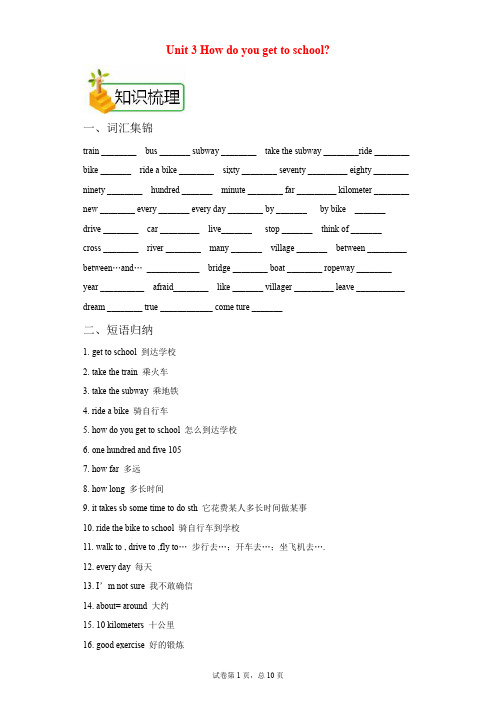
Unit 3 How do you get to school?一、词汇集锦train ________ bus _______ subway ________ take the subway ________ride ________ bike _______ ride a bike ________ sixty ________ seventy _________ eighty ________ ninety ________ hundred _______ minute ________ far _________ kilometer ________ new ________ every _______ every day ________ by _______ by bike _______ drive ________ car _________ live_______ stop _______ think of _______cross ________ river ________ many _______ village _______ between _________ between…and…____________ bridge ________ boat ________ ropeway ________ year __________ afraid________ like _______ villager _________ leave ___________ dream ________ true ____________ come ture _______二、短语归纳1. get to school 到达学校2. take the train 乘火车3. take the subway 乘地铁4. ride a bike 骑自行车5. how do you get to school 怎么到达学校6. one hundred and five 1057. how far 多远8. how long 多长时间9. it takes sb some time to do sth 它花费某人多长时间做某事10. ride the bike to school 骑自行车到学校11. walk to , drive to ,fly to…步行去…;开车去…;坐飞机去….12. every day 每天13. I’m not sure 我不敢确信14. about= around 大约15. 10 kilometers 十公里16. good exercise 好的锻炼17. drive his car to work 开车去上班18. in his father’s car 坐父亲的车19. need about 10 minutes to get to school 需要十分钟的时间到达学校20. what do you think of…=how do you like…你觉得怎么样21. cross the river 过河22. It is easy to get to school. 到达学校很容易。
Unit3知识归纳人教版七年级英语下册

Unit 3 How do you get to school ?1.get to 到达2. take the train/subway/bus 乘火车/地铁/公共汽车3.ride a bike骑自行车4. how far 多远how long 多长;多长时间5.from.to.... 从...到....·6.every day.每天7. by bike/bus/train/subway骑自行车/乘公共汽车/乘火车/乘地铁8. have a good day 过得愉快9.walk to school步行去学校10.bus stop/station 公共汽车站11.think of 认为;想起12. bus ride 乘公共汽车(名词短语)13.drive his car 开他的车14. the school bus 校车15. between...and... 在...和...之间16. go on a ropeway 乘/坐索道;滑铁索17. cross the river 过河(动词短语)18. one/an 11yearold boy 一个11岁的男孩19. play with sb / sth 玩...., 和....玩耍20. e true 实现;成为现实21.be like 像....22. many of.. .....中的许多23. school day上学日/ on school days 在上学日用法集萃1.take+冠词+交通工具+to+某地=go to+某地+by+交通工具乘.....去.....2.be afraid to do sth. 害怕做某事,不敢做某事be afraid of ( doing) sth. 害怕(做)某事3.want to do sth. 想要做某事4.have to do sth. 不得不做某事5.How does sb. get to...?某人怎样到达.6.How far is it from...to...?从...到...有多远?7.It is + 距离+ (from A地to B地)从A地到B地有.....8.How long does it take ( sb.) to do..? 做.....花费(某人)多长时间?9.It takes (sb.) + 时间+ to do sth. 做某事花费(某人)一些时间。
人教版七年级下册英语 Unit 3 基础知识单词、短语、句子默写版

Unit 3 How do you go to school A部分重点单词★根据汉语提示默写出下列单词1.火车n.2.公共汽车n.3.地铁n.4.骑v. 旅程n.5.自行车n.6.六十num.7.七十num.8.八十num.9.九十num.10.一百num.11.分钟n.12.远; 远的adv. & adj. 13.千米;公里n.14.新的; 刚出现的adj.15.每一; 每个adj.16.乘(交通工具)prep.17.开车v.18.小汽车;轿车n.19.居住;生活v.★写出下列单词变形1.drive⎼____________(现在分词)⎼____________(名词)司机2.sixty⎼______________(复数)3.live⎼______________(现在分词)4.bus⎼______________(复数)5.far⎼______________(反义词)重点短词★根据汉语提示默写出下列短语1.骑自行车2.乘公共汽车3.乘小汽车4.乘火车5.乘地铁6.每天7.到达学校8.一百零五9.骑自行车去上学10.多长时间11.多远12.度过愉快的一天重点句子★根据汉语提示默写出下列句子1.从你家到学校有多远?2.—你到学校花费多长时间?—骑车需要大约15分钟。
3.—你是怎样到学校的?—我骑自行车。
4.乘公共汽车需要大约20分钟。
5.在学校度过愉快的一天。
6.这是不错的锻炼。
7.—简步行上学吗?—不,她不是。
她骑自行车上学。
B部分重点单词★根据汉语提示默写出下列单词1.车站;停止n.2.横过;越过v.3.河;江n.4.许多adj. & pron.5.村庄;村镇n.6.介于…之间prep.7.桥n.8.小船n.9.索道n. 10.年;岁n.11.害怕;畏惧adj.12.像;怎么样prep.13.村民n.14.离开;留下v.15.梦想;睡梦n. 做梦v.16.真的;符合事实的adj.★写出下列单词变形1.true⎼______________(副词)2.cross(动词)⎼______________(介词)3.village⎼______________(名词)村民4.leave⎼______________(动词单三)重点短词★根据汉语提示默写出下列短语1.认为;想起2.公共汽车站3.公共汽车站台4.实现;成为现实5.地铁站6.火车站7.在…和…之间8.滑索道9.一个十一岁的男孩重点句子★根据汉语提示默写出下列句子1.对于许多学生来说,到学校很容易。
初中英语人教新目标七年级下册Unit 3 How do you get to school单元知识点

七年级英语下册Unit 3知识点【Useful expressions】1.get to school 到达学校2.take the subway 乘地铁3.take the train 乘火车4.take a car 坐小汽车5.take a taxi 乘坐出租车6.take the plane 乘飞机7.take the bus 乘公共汽车8.by bike 骑自行车9.ride a bike 骑自行车10.how far 多远11.from home to school 从家到学校12.every day 每天13.bus stop 公共汽车站14.think of 认为15.between…and…在…和…之间16.one 11-year-old boy 一个11岁的男孩17.play with…和…玩e true 实现19.have to 不得不20.leave home 离开家21.cross the river 过河22.be afraid of 害怕23.be like 像...【Target sentences】How do you get to school?— I ride my bike.2.— How long does it take to get to school?— It takes about 15 minutes.3.— How far is it from your home to school?—It’s only about two kilometers.4.—Does Jane walk to school?—No, she doesn’t.She goes by bike.5.—Do they take the bus to school?—No, they don’t.They walk.6.I ride my bike to the subway station.Then I take the subway.7.Mary wants to know where Bob lives.8.Mary wants to know how far he lives from his grandparents’ ho me.9.For many students, it is easy to get to school.10.There is a very big river between their school and the village.11.One 11-year-old boy, Liangliang, crosses the river every school day.12.But he is not afraid because he loves school.13.He’s li ke a father to me.【Language points】1.take the subway 乘地铁take作动词,意为“乘坐”。
人教版七年级下册英语Unit3知识点

Unit3 名词:train 火车bus 公共汽车subway 地铁bike 自行车car 汽车minute 分钟kilometer 千米river 河village 村庄villager 村民bridge 桥boat 船year 年动词:drive 开车live 居住cross 越过leave 离开形容词:new 新的every 每个afraid 害怕的true 真的介词:by 乘(交通工具)between 介于……之间兼类词:ride v骑n旅程far adj&adv 远many adj&pron 许多dream n梦想;睡梦v做梦短语:every day 每天think of 认为;想起come true 实现;成为现实between……and……在……和……之间1、表示交通方式take the train = by train 乘火车take the bus = by bus 乘公交车take the taxi = by taxi 乘出租车take the plane = by plane 乘飞机take the subway = by subway 乘地铁take a train = drive a car = by car 乘汽车/开汽车ride a bike = by bike 骑自行车2、It is + 形容词+ for sb to do sth 对于某人来说做某事怎么样It is important for us to study hard. 对于我们来说努力学习很重要。
It is easy for Tom to do his homework. 对于Tom来说做作业很容易。
3、every 每一;每个every day 每天every week 每周every month 每个月every year 每年every term 每学期He exercises every day. 他每天都锻炼。
人教版七年级下册英语Unit3知识点语法归纳总结
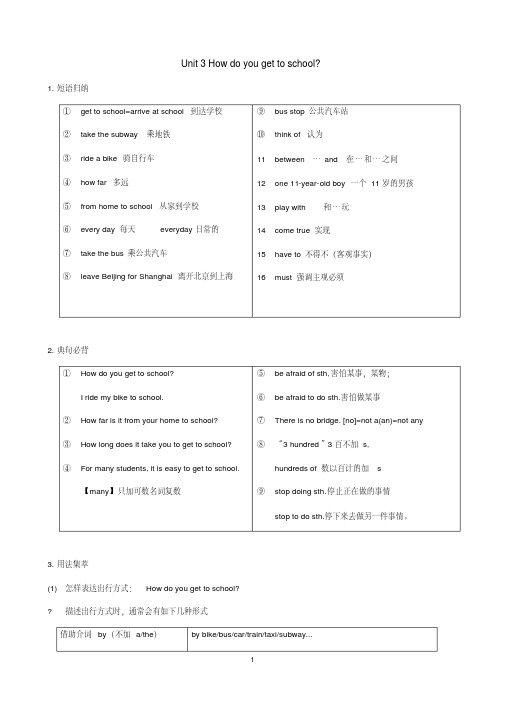
Unit 3 How do you get to school?1.短语归纳①get to school=arrive at school 到达学校②take the subway 乘地铁③ride a bike 骑自行车④how far 多远⑤from home to school 从家到学校⑥every day 每天everyday日常的⑦take the bus 乘公共汽车⑧leave Beijing for Shanghai离开北京到上海⑨bus stop 公共汽车站⑩think of 认为11between … and … 在…和…之间12one 11-year-old boy 一个11岁的男孩13play with … 和…玩14come true 实现15have to 不得不(客观事实)16must 强调主观必须2.典句必背①How do you get to school?I ride my bike to school.②How far is it from your home to school?③How long does it take you to get to school?④For many students, it is easy to get to school.【many】只加可数名词复数⑤be afraid of sth,害怕某事,某物;⑥be afraid to do sth.害怕做某事⑦There is no bridge. [no]=not a(an)=not any⑧“3 hundred” 3百不加s,hundreds of 数以百计的加s⑨stop doing sth.停止正在做的事情stop to do sth.停下来去做另一件事情。
3.用法集萃(1)怎样表达出行方式:How do you get to school?描述出行方式时,通常会有如下几种形式借助介词by(不加a/the)by bike/bus/car/train/taxi/subway...用take,drive, ride构成的动词短take a/the bus/train/plane语drive a/the one’s carride a/the one’s bike/bicycle借助介词on或in(加a/the)on a/the bike/bus/train; on foot; in a/the car注意:当交通工具的名词(如:bike, bus, train, car等)和by搭配时,它们前面不必加冠词;但当它们和on或in搭配时,它们之间要加冠词。
Unit3知识点归纳人教版英语七年级下册

Unit 3◆短语归纳1.乘火车\公共汽车\飞机\轮船去某地take a\the train\bus\plane\ship to sp.=go to sp. by train\bus\plane\ship2.乘地铁去某地take the subway to sp.=go to sp. by subway3.骑自行车去某地ride a\the\one’s bike to sp.=go to sp. by bike=go to sp. on a\the \one’s bike4.步行去某地walk to sp.=go to sp. on foot5.开车去某地drive a\the\one’s car to sp.=go to sp. by car=go to sp. in a car6.乘出租车去某地take a\the taxi to sp.=go to sp. by taxi=go to sp. in a taxi7.公共汽车之行the bus ride8.自行车十分钟的车程10minute bike ride=10 minutes’ bike ride9.到达学校get to school10.到家get home \ 到这get here \ 到那get there (副词前省略to)11.九百九十九朵玫瑰花(rose) nine hundred and ninetynine roses12.成百上千的村民hundreds of villagers13.离…远be far from… 离…近be near to…14.住得离…远live far from…15.居住在… live in\at…16.过着幸福的生活live\have a happy life17.每天\每星期\每月\每年\每学期every day\week\month\year\term18.公交汽车站bus stop \ 公交客运总站bus station19.在公交车站at the bus stop20.停下来去做某事stop to do sth.停下来去工作stop to work21.停止正在做的事stop doing sth.停止工作stop working22.阻止某人做某事stop sb. (from)doing sth.23.乘索道go on the\a ropeway24.想一下、想一想think of (仔细)思考、考虑think about\think over25.认为think of26.想起think of=think up=e up with27.过马路\过桥\过河cross the road\bridge\river=go\walk across the road\bridge\river28.做索道过河cross the river on a ropeway29.在第二个十字路口at the second crossing30.在你和我之间between you and me31.一个十一岁大的男孩an elevenyearold boy32.一条二十公里长的河流 a twentykilometerlong river33.害怕某事be afraid of sth.34.害怕做某事be afraid of doing sth.= be afraid to do sth.35.像…(品质、性格、外貌) be like36.看起来像(外貌)look like37.想我的父亲一样对我like a father to me38.离开兴城去北京leave Xingcheng for Beijing39.动身前往北京leave for Beijing40.把我的书包落家里leave my schoolbag at home41.梦见某人\某事dream of sb.\sth.E.g.他总是梦到他的母亲。
- 1、下载文档前请自行甄别文档内容的完整性,平台不提供额外的编辑、内容补充、找答案等附加服务。
- 2、"仅部分预览"的文档,不可在线预览部分如存在完整性等问题,可反馈申请退款(可完整预览的文档不适用该条件!)。
- 3、如文档侵犯您的权益,请联系客服反馈,我们会尽快为您处理(人工客服工作时间:9:00-18:30)。
Unit 3 How do you get to school?【短语归纳】get to school 到达学校take the subway 乘地铁ride a bike 骑自行车how far 多远from home to school 从家到学校every day 每天take the bus 乘公共汽车by bike 骑自行车bus stop 公共汽车站think of 认为between …and …在…和…之间one 11-year-old boy 一个11岁的男孩(必须放于名词之前) play with …和…玩come true 实现have to 不得不【用法集萃】take…to …= go to …by…乘…去…How do / does (sb)get to …? …是怎样到…的?How far is it from …to …? 从…到…有多远?It takes sb. some time to do sth. 做某事花费某人多长时间。
How long does it take …? …花费多长时间?It is + adj. + to do sth. 做某事是….Thanks for + n. / v. ing 感谢你(做)某事。
【语法探究】Ⅰ. how引导的一般现在时态的特殊疑问句1. 特殊疑问词how提问动作的________。
如:—How do you go to school? “你如何上学呢?”—I ride my bike to school. “我骑自行车去上学。
”2. 表达动作行为的方式,使用动词take (乘坐)、ride (乘车) 、walk(步行)、fly(乘飞机)等;使用介词by等。
主语+take/ride/walk/fly +to +地点=主语+go to +地点+by +交通工具。
如:(1)He takes the plane to Beijing. =He ___________________Beijing. =He goes to Beijing by _____________.(2)She walks to school. =She goes to school _________ _________.Ⅱ. how far 与how long的区别how far是提问两地之间的_________,how long 用来提问_______________或某个事物的_________。
如:It is five kilometers from my home to my school. (距离) →_______ _______ is it from your home to your school? The river is 1,000 kilometers long. (距离) →_______ _______is the river?The meeting is 2 hours. (时间段) →_______ _______is the meeting?Ⅲ. hundred的两种用法1. hundreds of +名词复数,“数以百记的,成百上千的,”表示一种“___________”;2. 数字+hundred +名词复数,“……百”,表示“___________”。
如:There are hundreds of people on the island. 岛屿上有成百上千的人。
He has five hundred interesting books. 他有五百本有趣的书籍。
【练习吧】一.首字母填词 1. She r_______ his bike to school every day. 2. How do you g________ to school?3. It takes about 20 m________to walk to school.4. One k____ is 1,000 meters.5. I have a map but it's in E________. I can't read it.6. Let me w________ your new coat.7. We usually go to school at half p___ seven. 8.How l______does it take ? —Half an hour .二.用所给词的正确形式填空1.---How ______ Bob _______(get) to school?---He takes the bus.2.There ______ (be) sixty _________(minute) in an hour.3.It takes _____ (I) 2 hours ________(do) my homework .4. Let me __________(look) at your map.5.It takes him about half an hour ________(walk) to school.6.The early bus _______(take) _______(he) to school at 8:00.7.How far _____ Jim ______(live) from here?8.If you have problems, you can __________(ask)the policeman. 9. Tom usually __________(ride) his bike to school.10.It’s about twenty __________ (minute) walk to get there. 11.Don’t say it in ________ (Chin a). Say it in English.12.What do you ________ (usual) do on Sundays?一、单项选择1. does it take to get to school? Twenty minutes.A. HowB. How farC. How longD. How many2. 一it from the radio station? 一It’s about 5 kilometers.A. How longB. How farC. How muchD. How many3.一How do you school?一I take the train. A. get B.get to C. arrive D.arrive to4.I walk to school every day.____?A. What about you doB. What do youC. How about youD. What about your5. How do the students get to school Monday morning? A. on B.in C. at D.for6一your teacher____home? 一Yes, she does. A. Do; drive B.Does; drive C. Do; drives D. Does; drives7. He has to take a boat to work. A. get B.to get C. got D. gets8. 一How does your father go to work? 一He a bus there every day.A.takesB.rideC. walksD. goes9.一How many Chinese players (运动员) are there in the 2012 London Olympics (奥运会) ? 一About .A.three hundredB.three hundredsC.three hundred ofD.three hundreds of10.How do you get____from the bridge? 一On a ropeway. A. to home B. to school C.to here D. the room11. Nancy loves stories for children. A. write B. writes C. to write D. wrote12. How long it to get to his home? A.do; take B. do; takes C. does; take D. does takes13. Mr Han has a son and he is happy. A. 3 year old B. 3-year-old C. 3-years-old D. 3 years old14. What do you this new club,? It’s nice and big. A. get to B. think of C. live to D. go to15.It usually takes about ten minutes ____to school. A. by bike B. on a bike C.to ride D. ride二、句型转换,每空一词1. They go to school by train.(就画线部分提问) do they to school?2.It takes about 20 minutes to go there by bus.(就画线部分提问) does it to go there by bus?3.It’s 5 kilometers from my home to school.( 就画线部分提问) is it from home to school?4. The boy often rides bike to school. (改为一般疑问句)5.1 need to see my friend.(就划线部分提问) do you need ?三、根据句意填写疑问词组,完成下列句子,每空一词。
1. 一people are there in the picture? 一Six.2. 一does she read every day? 一Three hours.3. 一does he have music class? 一Twice a week.4. 一is it from our school to here? - About 1,000 kilometers.5. 一money does Linda want 一1,000yuan.四、根据汉语提示完成句子。
